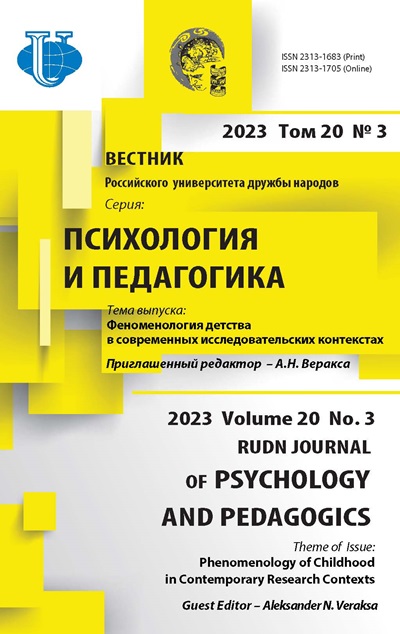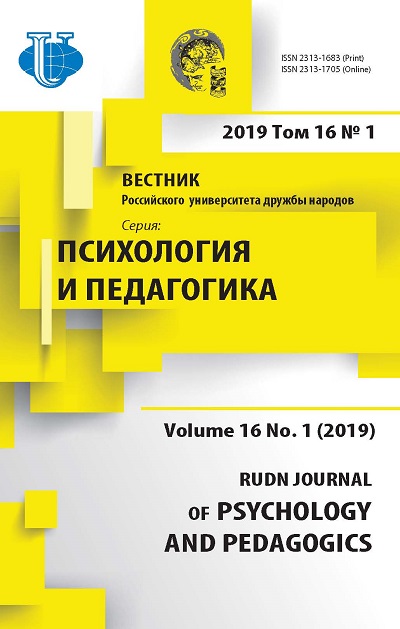Values as Predictors of Parent - Child Interaction Specifics in Finno-Ugric and Russian Families
- Authors: Khotinets V.Y.1, Kozhevnikova O.V1, Vyatkin B.A2, Vologdina V.A1
-
Affiliations:
- Udmurt State University
- Perm State Humanitarian-Pedagogical University
- Issue: Vol 16, No 1 (2019)
- Pages: 7-19
- Section: CLINICAL PSYCHOLOGY AND PSYCHOPHYSIOLOGY
- URL: https://journals.rudn.ru/psychology-pedagogics/article/view/20824
- DOI: https://doi.org/10.22363/2313-1683-2019-16-1-7-19
Cite item
Full Text
Abstract
The paper represents the results of exploring the effects of values on the specifics of parentchild interaction in Finno-Ugric families (Udmurts, Komi-Permyaks) in comparison to the Russian ones. 280 respondents, including 140 mothers and 140 children (56 % are females) have participated in the research: 1) representatives of the Finno-Ugric (Ural) peoples: Udmurts (94 individuals) from villages of Mozhginsky district of the Udmurt Republic and Komi-Permyaks (86 individuals) from the villages of Komi-Permyak Okrug of Perm Krai; 2) representatives of the Russian ethnocultural group (100 individuals) from the village Ust-Kachka of Perm Krai. The standardized techniques have been implemented: the technique by S. Schwartz adapted by N.M. Lebedeva for measuring values at the individual level and the questionnaire by I.M. Markovskaya for exploring parent-child interactions. The methodology and procedures of Structural Equation Modeling (SEM) have been used as the main statistical method. It is revealed that parent-child interaction in Finno-Ugric families living in rural settlements with the autochthonic population is based on collectivistic values of self-preservation and survival, harmonious interaction with others. At the same time, the effect of a distinct individualistic value of independence on the indicators of the cohesion of parent-child interaction positions is found in Russian families. The results obtained during the research can be implemented while developing pedagogic techniques including the algorithms of inculturation of children in social institutions.
About the authors
Vera Yu Khotinets
Udmurt State University
Author for correspondence.
Email: khotinets@mail.ru
Doctor Sc. of Psychology, Full Professor, Head of General Psychology Department, Udmurt State University
1 Universitetskaya St., Izhevsk, 426034, Russian FederationOksana V Kozhevnikova
Udmurt State University
Email: oxana.kozhevnikova@gmail.com
Ph.D. in Psychology, Associate Professor of General Psychology Department, Udmurt State University
1 Universitetskaya St., Izhevsk, 426034, Russian FederationBronislav A Vyatkin
Perm State Humanitarian-Pedagogical University
Email: bronislav.vyatkin@gmail.com
Doctor Sc. of Psychology, Full Professor, Research Supervisor of the Institute of Psychology, Perm State Humanitarian Pedagogical University
24 Sibirskaya St., Perm, 614990, Russian FederationValeria A Vologdina
Udmurt State University
Email: boss.vologdina@mail.ru
graduate student of General Psychology Department, Udmurt State University
1 Universitetskaya St., Izhevsk, 426034, Russian FederationReferences
- Albert, I., Trommsdorff, G. & Wisnubrata, L. (2009). Intergenerational Transmission of Values in Different Cultural Contexts: A Study in Germany and Indonesia. In A. Gari (Ed.). Quod erat demonstrandum: From Herodotus’ ethnographic journeys to cross-cultural research (pp. 221—230).Athens: Pedio.
- Bauman, Z. (2008). Tekuchaya sovremennost’. Saint Petersburg: Piter Publ. (In Russ.)
- Dubrov, D. & Tatarko, A. (2018). Intergenerational Transmission of Values in Urban and Rural Areas of Russia: The Role of Perceived Psychological Closeness. In N. Lebedeva, R. Dimitrova, J. Berry (Eds.). Changing Values and Identities in the Post-Communist World. Societies and Political Orders in Transition (pp. 117—130). Springer, Cham. doi: 10.1007/978-3-319-72616-8_7
- Feldshtein, D.I. (2013). Funktsional’naya nagruzka akademii obrazovaniya v opredelenii printsipov i uslovii razvitiya rastushchego cheloveka na istoricheski novom urovne dvizheniya obshchestva (doklad na obshchem sobranii RAO 29 oktyabrya 2013 g.). Problemy sovremennogo obrazovaniya, (5). http://pmedu.ru/res/2013_5_2.pdf (accessed: 26 September 2018). (In Russ.)
- Guseltseva, M.S. (2016). Princip razvitiya v psikhologii: vyzovy poliparadigmal’nosti i transdisciplinarnosti. In A.L. Zhuravlev, E.A. Sergienko (Eds.). Princip razvitiya v sovremennoi psikhologii (pp. 31—51). Moscow: Institute of Psychology of RAS Publ. (In Russ.)
- Khotinets, V.Yu. (2005). Psikhologicheskie i kul’turnye faktory etnotipicheskogo povedeniya. Psikhologicheskii zhurnal, 26(2), 33—44. (In Russ.)
- Khotinets, V.Yu. (2011). Razvitie polikul’turnoi kompetentnosti starsheklassnikov v khode proektnoissledovatel’skoi deyatel’nosti. Innovacionnye proekty i programmy v obrazovanii, (5), 43—47. (In Russ.)
- Khotinets, V.Yu. (2015). Osobennosti sotsializatsii i individualizatsii sub”ektov obrazovatel’nogo prostranstva v polikul’turnykh usloviyakh. In B.A. Vyatkin (Ed.). Individual’nost’ rastushchego cheloveka v usloviyakh sovremennoi shkoly (pp. 59—73). Perm: PGGPU Publ. (In Russ.)
- Khotinets, V.Yu. & Pletnikov, A.I. (2018). Soglasovannost’ individual’nykh i kul’turnykh tsennostei kak faktor zashchishchennosti podrostkov ot bullinga v shkol’noi srede. Psikhologicheskii zhurnal, 39(4), 72—85. doi: 10.31857/S020595920000072-5 (In Russ.)
- Khotinets, V.Yu., Vyatkin, B.A. & Medvedeva, D.S. (2017). Razvitie rechemyslitel’noi deyatel’nosti detei-bilingvov sredstvami kul’turnogo diskursa. Zhurnal “Pedagogika” (“Sovetskaya pedagogika”): 80 let sluzheniyu otechestvennomu obrazovaniyu. Conference Proceedings (Part 1, pp. 278—283). Moscow: Pedagogika Publ. (In Russ.)
- Lebedeva, N.M. & Tatarko, A.N. (2007). Cennosti kul’tury i razvitie obshchestva. Moscow: HSE Publ. (In Russ.)
- Levy, R., Widmer, E. & Kellerhals, J. (2002). Modern Family or Modernized Family Traditionalism? Master Status and the Gender Order in Switzerland. https://www.researchgate.net/ publication/223068014_Modern_family_or_modernized_family_traditionalism_Master_status_ and_the_gender_order_in_Switzerland (accessed: 26 September 2018).
- Marcinkovskaya, T.D. & Yurchenko, N.I. (2016). Problema sovladaniya v tranzitivnom obshchestve. Psikhologicheskie issledovaniya, 9(49). http://psystudy.ru (accessed: 26 September 2018). (In Russ.)
- Markovskaya, I.M. (1999). Oprosnik dlya izucheniya vzaimodeistviya roditelei s det’mi. Semeinaya psikhologiya i semeinaya terapiya, (2), 94—108. (In Russ.)
- Mavrokonstantis, P. (2015). Modern Family: Female Breadwinners and the Intergenerational Transmission of Gender Norms. http://sticerd.lse.ac.uk/dps/pep/gendernorms.pdf (accessed: 26 September 2018).
- Mid, M. (1988). Kul’tura i mir detstva: izbrannye proizvedeniya. Moscow: Nauka Publ. (In Russ.) Nasledov, A.D. (2013). IBM SPSS 20 i AMOS: professional’nyi statisticheskii analiz dannykh. Saint Petersburg: Piter Publ. (In Russ.)
- Nikitina, G.A. (1997). Narodnaya pedagogika udmurtov. Izhevsk: Udmurtiya Publ. (In Russ.)
- Pratt, M.W., Norris, J.E., Hebblethwaite, S. & Arnold, M.L. (2008). Intergenerational Transmission of Values: Family Generativity and Adolescents’ Narratives of Parent and Grandparent Value Teaching. Journal of Personality, (76), 171—198. doi: 10.1111/j.1467-6494.2007.00483.x
- Schönpflug, U. (2001). Intergenerational Transmission of Values: The Role of Transmission Belts. Journal of Cross-Cultural Psychology, (32), 174—185. doi: 10.1177/0022022101032002005
- Schwartz, S.H. (2007). Value Orientations: Measurement, Antecedents and Consequences Across Nations. In R. Jowell, С. Roberts, К. Fitzgeral, & G. Eva (Eds.). Measuring Attitudes CrossNationally: Lessons from the European Social Survey (pp. 169—203). London: Sage Publications.doi: 10.4135/9781849209458.n9
- Tatarko, A.N. & Lebedeva, N.M. (2011). Metody ehtnicheskoi i krosskul’turnoi psikhologii. Moscow: HSE Publ. (In Russ.)
- Vladykin, V.E. & Khristolyubova, L.S. (2008). Udmurty: istoriko-etnograficheskii ocherk. Izhevsk: Udmurtiya Publ. (In Russ.)
















